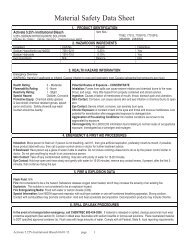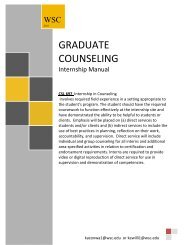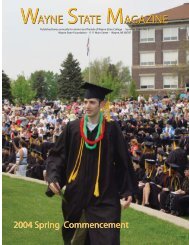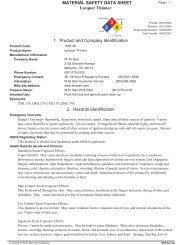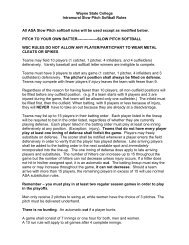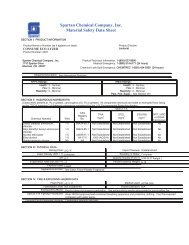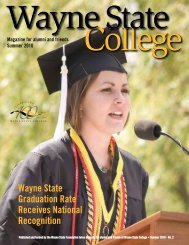Full Catalog - Wayne State College
Full Catalog - Wayne State College
Full Catalog - Wayne State College
- No tags were found...
You also want an ePaper? Increase the reach of your titles
YUMPU automatically turns print PDFs into web optimized ePapers that Google loves.
78 <strong>Wayne</strong> <strong>State</strong> <strong>College</strong>implications for methodology and leadership style, andethical issues related to a group environment. This courseincludes supervised practice.CSL 670 Organization/Administration of CounselingServices (3) This class is an introduction to the historicaldevelopment of counseling services and significantsocietal changes impacting on the evolution of the helpingprofession. The class is designed to prepare graduatelevel counselor trainees to develop, deliver, and maintainoutcome/performance-based counseling service programsthat facilitate the academic, personal/social and careerdevelopment of individuals. An emphasis is placed on theintegration of counseling services within either a school oragency setting.CSL 675 Differential Diagnosis and Treatment Planning inCounseling (3) This course is a study of the most commonpersonality disorders manifested within American society,schools, and community counseling settings. It is designedto facilitate collaboration among school and communitycounselors and other primary care providers. Theprimary focus is on contemporary diagnostic descriptions;advances in differential diagnostic procedures; currenttheoretical perspectives; and prevalent treatment planningstrategies that guide the intervention process. Assessmentof individual needs, intervention program design andimplementation, and documentation of progress is alsoaddressed. Etiology, diagnosis, treatment planning andtherapeutic interventions are based on contemporarydiagnostic descriptions. Diverse intervention strategieswill be identified to meet the needs of a multiculturalsociety. Specific protocols will be illustrated for diagnosis,treatment planning, and therapeutic intervention.Psychological disorders will be presented in specific casestudies, counseling transcripts, films, and videotapes ofactual counseling sessions. Ethical issues associated withcounseling those with psychological disorders will beconsidered in detail.CSL 685 Practicum in Counseling (3) Introduction, practice,and mastery of basic skills for structuring a counselinginterview. (Minimum grade of “B-” and the ability to relateempathetically and therapeutically is required.)CSL 686 Advanced Practicum (3) Prerequisites: CSL 600, 685,and admission to program. Provides for the developmentof individual and group counseling skills beyond the initialpracticum with direct service to clients. This course isdesigned to model, demonstrate, and train for clinicalapplication. (A minimum grade of “B-“ and the abilityto relate empathically, therapeutically, and ethically isrequired.)CSL 688 Crisis Intervention Counseling (2) This course willidentify the immediate and long-term impact of crises,disasters, and trauma on individuals and organizations.The principles of risk assessment and management, crisisintervention, and the role of the counselor in emergencymanagement teams will be described. Guidelines forprofessional, school, and community responses to suicidalthreats and completions, violence, bereavement, substanceabuse crises, and other trauma will be emphasized. Self-carestrategies for counselors working with trauma and crises willalso be explored.CSL 697 Internship in Counseling (2-12) Prerequisites: CSL665, 686, instructor approval. Required field experience ina setting appropriate to the student’s program. Emphasiswill be placed on the development of individual and groupcounseling skills and competencies. Interns are required toprovide videotapes of counseling sessions for on-campuscritique sessions with a campus supervisor and other interns.Any exceptions to videotaping must be approved by theinstructor. An intern who cannot be directly observed bythe on-site supervisor will provide videotapes of counselingwork for the supervisor’s feedback. Students employed ascounselors and taking Internship will arrange two visitationsto other field sites in the area in which they are completingthis internship. All students will register for 3 hours exceptfor community counselors who may elect to register for 2hours for their second internship. (Minimum grade of “B-”and modeling ethical and personal behavior articulated in theACA Code of Ethics and Standards of Practice is required.)Criminal Justice (CJA)Sociology, Psychology & Criminal Justice DepartmentSchool of Natural & Social SciencesConnell HallObjectives: The Criminal Justice program is designed toprovide students with the necessary practical knowledge andskills for careers in the Criminal Justice field and knowledge ofthe theoretical basis for understanding the economic, political,and social environments in which the criminal justice processoperates. The CJ comprehensive major consists of a total of57 hours, with available concentrations in Law Enforcementand Corrections. For students in majors other than CriminalJustice, a minor in Criminal Justice is available. The CriminalJustice program is offered in cooperation between WSC andNortheast Community <strong>College</strong> in Norfolk, Nebraska, about 30miles away. Certain courses are offered by Northeast facultyon the WSC campus.Completion of the Criminal Justice degree program, orportions thereof, is not a guarantee of employment in thecareer field. Agencies may require background investigations,medical/psychological/physical fitness evaluations, interviews,and additional training.Major in Criminal Justice (BA or BS) 57 hoursSpanish is required in Block 3 Philosophy & ModernLanguages General Education requirements for all CriminalJustice majors. In addition CJ majors should plan to take PSY101 or SOC 101 to apply toward their Block 3 Social SciencesGeneral Education requirement.



